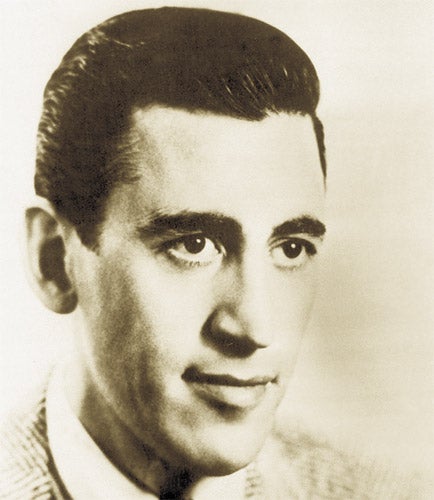Catcher in the Rye: The Sequel (or why JD Salinger is heading for the courts)
Hermit author sues to block publication of novel about Holden Caulfield in a nursing home

Your support helps us to tell the story
From reproductive rights to climate change to Big Tech, The Independent is on the ground when the story is developing. Whether it's investigating the financials of Elon Musk's pro-Trump PAC or producing our latest documentary, 'The A Word', which shines a light on the American women fighting for reproductive rights, we know how important it is to parse out the facts from the messaging.
At such a critical moment in US history, we need reporters on the ground. Your donation allows us to keep sending journalists to speak to both sides of the story.
The Independent is trusted by Americans across the entire political spectrum. And unlike many other quality news outlets, we choose not to lock Americans out of our reporting and analysis with paywalls. We believe quality journalism should be available to everyone, paid for by those who can afford it.
Your support makes all the difference.Scholars and admirers of JD Salinger can be reassured that although he still resolutely refuses to show his face in public – let alone add a new title to his long-stalled oeuvre – he is still alive and alert. Or at least his lawyers are, as demonstrated by a certain lawsuit freshly filed in New York this week.
Regrettably, 90-year-old Salinger himself was not in court but presumably in hiding in his New Hampshire home when his representatives delivered the suit demanding an injunction to block the publication of an unauthorised sequel to the ever-venerated Catcher in the Rye, the 1951 novel that made it fashionable for adolescent boys to wrap themselves for years in existential angst.
How good or awful the unwanted tribute is we may never know, but the signs are not altogether promising. It is entitled 60 Years Later: Coming Through the Rye and apparently aims to reacquaint readers with Holden Caulfield, the young man Salinger conjured in the original.
Caulfield is no longer a fretful teenager running from prep school, but a fretful septuagenarian fleeing a retirement home. Better yet, or worse, the perpetrator, who, we learn, lives near Gothenburg in Sweden and writes under the appropriately cheeky pen name of JD California, even goes to the trouble of giving Salinger a part in the disputed book, agonising over whether he should be relaunching the story of Caulfield or not.
But our man in Sweden was mistaken if he thought the hermit of New Hampshire would find his stunt either amusing or flattering. He should have remembered that in recent decades only court litigation has been enough to flush the novelist back into the open, although never, of course, in person.
"The sequel is not a parody and it does not comment upon or criticise the original," the lawsuit bluntly contends. "It is a rip-off, pure and simple." The court papers go on to say that Salinger remains "fiercely protective of his intellectual property". It points out, moreover, that he has turned down the likes of Harvey Weinstein and Steven Spielberg when they sought permission to put Caulfield on the silver screen.
Named as defendants in the case are Mr California himself, a firm called Windupbird Publishing that is apparently based in London, as well as a Swedish publisher Nicotext and SDB Distributors of California. The suit seeks damages as well as action to prevent the book – due to be published in Britain this summer and in the US in September – ever seeing the light of day.
The papers additionally assert that while Salinger, who holds the exclusive copyright to the 1951 original, which has so far sold 65 million copies, could have at any time agreed that it be filmed, staged or otherwise adapted, he has "decidedly chosen not to exercise that right".
Salinger has not published an original work since 1965 and has not granted an interview since the 1980s. But if his editors have been left idle, his lawyers have not. In 1982, he sued a man who was apparently attempting to sell a fictitious interview with him. Five years later he moved to prevent publication of an unauthorised biography by Ian Hamilton because it included quotes from unpublished letters. That book did at least come out, but in revised form, in 1988. Then in 2003, he blocked a stage version of Rye by the BBC.
Contacted by the Associated Press in Sweden, Mr California – he declined to offer his real name – said he considered the legal action against him a "little bit insane" asserting that while Salinger may have control of his characters he does not of his style or perspective. "To me, this is a story about an old man. It's a love story, a story about an author and his character," he explained.
Not everyone is convinced that Salinger is on strong legal ground. A few years ago the estate of Margaret Mitchell launched a similar lawsuit to block a so-called sequel to her classic Gone With The Wind that was called The Wind Done Gone and written from the perspective of a slave on Scarlett O'Hara's plantation. The suit did not work and the book was published even though its publishers did agree to pay an unspecified sum by way of settlement to the Mitchell estate.
" Catcher in the Ryle is a touchstone. It is published. It is no longer wholly and only the author's," contended Vickie Karp yesterday, an arts writer for the Huffington Post.
Join our commenting forum
Join thought-provoking conversations, follow other Independent readers and see their replies
Comments